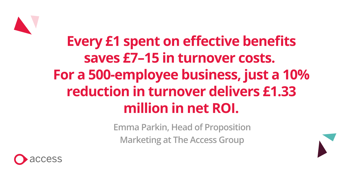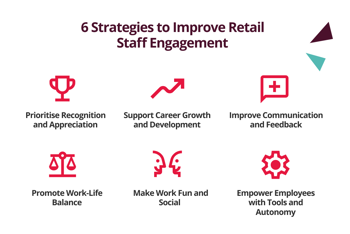
Why does employee engagement matter in retail?
When a retail team is truly engaged, it's a game-changer. Engaged employees deliver better customer service, which directly boosts sales and improves the overall customer experience. Beyond that, a motivated team is a stable team. This focus on engagement significantly reduces costly turnover, allowing you to build a reliable and experienced workforce that is dedicated to the store's success.
Let’s dive deeper into a few of those key reasons:
1. Impact on Your Customer Experience
The direct link between an engaged workforce and the customer experience is undeniable. When employees feel positive about their job and their company, it radiates outward to your customers. An engaged team is more attentive, knowledgeable, and genuinely enthusiastic about helping customers, which leads to better service, higher satisfaction, and stronger brand loyalty.
Retail field insights from UKG (synthesising sector research, including McKinsey) show stores with lower frontline turnover (a proxy for stronger retail employee engagement) achieve ~3 percentage points higher comparative store sales, a reminder that customer experience is powered by staff experience.
2. Higher productivity
Engaged employees are far more productive. When a team feels valued and connected to their work, they are motivated to go above and beyond their basic duties. This intrinsic motivation translates to higher output, better quality work, and increased efficiency on the factory floor. They are also more likely to be innovative and contribute ideas for process improvements, directly impacting the company’s bottom line.
3. Improved morale
A highly engaged team is a happier, more positive, and more collaborative team. This improved morale reduces workplace stress and creates a more supportive environment where everyone feels valued and motivated. This positivity is contagious, making the entire workplace a more enjoyable place to be and boosting overall team cohesion.
Common challenges when engaging retail employees
Employee burnout, stress from long hours, and poor scheduling are key issues when engaging retail employees. Additionally, communication breakdowns across different teams and a lack of clear career paths often leave staff feeling disengaged and under-motivated.
- Burnout and stress from long shifts: 75% of frontline employees report burnout in 2024 global research by UKG.
- Disorganised rotas and poor scheduling: Frontline employees in retail are consistently looking for better flexibility and predictable scheduling to improve the employee experience.
- Lack of career progression: Without a clear path for progression, retail staff particularly on the front line can struggle for motivation to engage with their work meaningfully.
- Poor communication: Employee communication is a clear challenge in retail with office-based, remote, hybrid and frontline staff making up the workforce. Challenges in reaching staff with consistent communications risks confusing staff and leaving many out of the loop, hurting employee engagement.
- Low pay and limited benefits: Rewards clarity and perceived fairness are strong drivers in the retail EVP; many employees don’t fully understand the benefits available to them without better communication, and the gap between perceived value and actual value offered by retail businesses as part of their total rewards package can directly impact employee engagement too.
To help clarify and strengthen your employee value proposition, download our Employee Value Proposition Template which is a practical resource designed to support better communication and alignment around total rewards and employee experience.

6 strategies to improve retail staff engagement
1. Prioritise Recognition and Appreciation
Ultimately, retail businesses can dramatically improve employee engagement by rewarding and recognising fairly, consistently and personally, while ensuring appropriate and impactful employee benefits are not just offered but communicated effectively to drive employee benefits engagement, thus driving consistent employee engagement in the process.
- Build weekly manager shout‑outs (pre‑shift huddles), peer‑to‑peer recognition (through effective peer-to-peer recognition software) and regular awards tied to your values (customer kudos, NPS shifts, mystery shop wins).
- Make employee benefits clear and visible and frame them as part of recognition, not separate admin.
- Recognition is one of the most reliable levers for loyalty and performance; while conversely inconsistent, fragmented and unfair recognition can hurt employee engagement across the board
“Every £1 spent on effective benefits saves £7–15 in turnover costs. For a 500‑employee business, just a 10% reduction in turnover delivers £1.33m in net ROI.”
Emma Parkin, Head of Proposition Marketing, The Access Group (Beyond the Payslip webinar)
Think of your employee benefits, rewards and recognition is a key lever to pull in terms of driving employee engagement.
Investing in the right software here for retail businesses is incredibly important, with substantial ROI to be had with the effects on employee engagement, motivation and productivity clear to see.
2. Support Career Growth and Development
Giving employees a clear path with clear instructions on how to navigate career advancement hugely facilitates employee engagement. You can offer things like:
- Offer training, mentorship and career mapping (e.g., Associate to Keyholder to Supervisor to Assistant Manager).
- Publicise internal promotions and “career story” spotlights to show real trajectories.
- Retail engagement leaders combine skills variety, involvement in decisions and perceived fairness of total compensation to retain staff in the retail industry.
Employees who can see real career and salary progression and are handed the right opportunities at the right time will engage much more across the board.
In retail, providing a clear path from frontline store roles through to management and even progression into head office roles can dramatically improve employee retention and engagement.
3. Improve Communication and Feedback
As mentioned, communication is key. Retail businesses may provide great career progression, training opportunities and even employee benefits, but if employees don’t know about them, the gap between perceived value and actual value provided persists, hurting employee engagement in the process.
You can use the following strategies to help improve this.
- Use mobile‑friendly platforms to reach deskless teams with updates, SOP changes and quick polls; pair with store digital noticeboards for shift workers.
- Encourage two‑way feedback and respond visibly (“You said, we did”).
4. Promote Work-Life Balance
Improving the retail employee experience requires a dual focus on flexible operations and genuine wellness support. Offering flexible scheduling with clear advance notice and easy shift-swapping is essential for frontline staff. At the same time, businesses must provide comprehensive wellness programs and equip managers to spot signs of burnout.
The right retail HR software is crucial for these initiatives. A single platform can manage flexible scheduling across all sites and deliver wellness benefits to every employee. This unified approach makes it possible to scale your efforts and shows your commitment to employee well-being is a core business practice.
5. Make Work Fun and Social
Cultivating a sense of community is crucial for boosting morale and engagement in the fast-paced retail environment. Organise short, low-cost team events and create designated "relax zones" for breaks to help staff de-stress. Celebrate both personal and professional milestones to show appreciation and reinforce team bonds.
Harnessing employee communication software is key to supporting these efforts. These platforms strengthen a sense of belonging by making social support and information-sharing easy and accessible for everyone. Leaning into the fun and social aspects of retail work helps to make the job more enjoyable and aligns with the passions of many who are drawn to the industry.
6. Empower Employees with Tools and Autonomy
- Empowerment is perhaps one of the greatest levers HR teams and managers can pull when it comes to retail. Many employees are yearning for more responsibility and are keen to take on new challenges.
- Provide modern mobile tools (rostering, comms, learning, task lists) and the training to use them. Better tech helps frontline workers meaningfully and reduces stress when paired with leadership support.
- Let people lead micro‑initiatives (visual merchandising refreshes, local community events, store sustainability projects) and present the results. Autonomy deepens commitment.
Lean into this to drive employee engagement that remains consistently high.

How are leading retailers improving engagement?
Cineworld – Empowering Staff with Self-Service and Smart Scheduling
Cineworld are a perfect example of a retail business that drive high and consistent employee engagement with their diverse retail workforce.
Here’s how they’ve utilised their HR tech stack to seamlessly drive employee engagement.
- Implemented Access PeopleXD Evo to streamline rostering, payroll and employee self‑service.
- 8,500+ shift swaps completed in the first three months, with no management time required.
- Managers save ~5 hours per week thanks to automation; staff manage work‑life via mobile.
- Outcome: cost savings, stronger data security and real‑time workforce insights across sites.
Turn retail engagement challenges into strategic action
Strong retail employee engagement doesn’t happen by accident. It’s the outcome of consistent rituals (huddles, shout‑outs), reliable communication (mobile + in‑store screens), clear careers and empowered managers, with tech and data to scale what works.
A strong and well communicated total rewards package including comprehensive employee benefits, strong cultural alignment and tech that works from all staff from head office to retail stores are all key factors in ensuring high and consistent employee engagement.
With the right approach, retail businesses can dramatically offset high turnover, drastically improve business performance and directly impact the P&L with strategies that can really drive their employees and their business forward.
HR teams in retail businesses are perfectly placed to implement initiatives, maximise tech investment and introduce strategies to drive high and sustained employee engagement, directly contributing to business growth and employee satisfaction.
Ready to put this into practice?
Ready to boost engagement in your retail teams? Explore Access Group’s employee engagement tools today or book a personalised demo.
Discover how Access Group can help your retail business thrive — see our retail HR solutions in action.

 AU & NZ
AU & NZ
 SG
SG
 MY
MY
 US
US
 IE
IE
